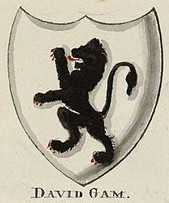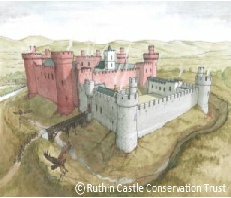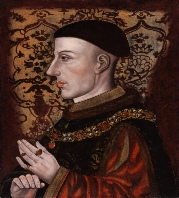Glyndŵr’s Uprising had the support of most of the Welsh population - but not all. His biggest opponents were often descendants of the English families that had gained lands after Edward I’s conquest in 1282, or Welsh families that benefitted from their overlordship.
Dafydd  Gam, for example, was a member of a family that had supported the Bohun lords of Brecon for many years and, eventually, the House of Lancaster and Henry Bolingbroke. Dafydd provided local information which helped the English armies on their campaigns into South Wales, and at the battle of Pwll Melyn, in particular. He was captured by Glyndŵr in 1412 and a substantial ransom was paid for his release.
Gam, for example, was a member of a family that had supported the Bohun lords of Brecon for many years and, eventually, the House of Lancaster and Henry Bolingbroke. Dafydd provided local information which helped the English armies on their campaigns into South Wales, and at the battle of Pwll Melyn, in particular. He was captured by Glyndŵr in 1412 and a substantial ransom was paid for his release.
Hywel Sele of Nannau was a distant cousin of Owain’s who apparently attempted to kill him on Hywel’s estate near Dolgellau. Legend says that he was instead killed by Glyndŵr, who then hid his body in the trunk of a tree. A number of other Welsh people spied for the English, such as Maredudd Ieuan Gwyn in Rhuddlan, and Ieuan ap Maredudd and David Whitmore in Flintshire. It is known that Ieuan and Whitmore attended Glyndŵr’s parliament in Harlech to gain information for Henry IV, for example.
The Welsh people had endured harsh conditions and heavy taxes for many years, and Owain’s Uprising was a result of a growing unrest after Henry IV had usurped the English throne. Despite influential Englishmen transferring their allegiance to Glyndŵr during the Uprising, such as Edmund Mortimer and the Percy family, Henry was still able to rely on a large number of experienced men to support him.
Reginald  de Grey was the lord of Ruthin and a neighbour of Glyndŵr. A long-running land dispute between the two is often cited as the main cause of the Uprising: de Grey was a good friend of Henry IV and influenced the English king’s treatment of Owain. Glyndŵr’s men managed to capture Reginald in April 1402, however, and a large ransom was raised for his release - the repayment of which almost bankrupted his family.
de Grey was the lord of Ruthin and a neighbour of Glyndŵr. A long-running land dispute between the two is often cited as the main cause of the Uprising: de Grey was a good friend of Henry IV and influenced the English king’s treatment of Owain. Glyndŵr’s men managed to capture Reginald in April 1402, however, and a large ransom was raised for his release - the repayment of which almost bankrupted his family.
Various people led forces against Glyndŵr: during the first week of the campaign, Robert Mascy and Hugh Burnell fought Glyndŵr’s men near Flint and Welshpool, respectively, and Thomas, Lord Carew did the same near St Clears in 1403. John Charlton of Powys Castle led an English force at a skirmish at Dinas Mawddwy in 1401 and then his younger brother, Edward, defended Welshpool against attacks by Owain’s men until his death in 1421.
The En glish army became more efficient under the leadership of Henry IV’s son, Prince Henry. Richard Beauchamp, the earl of Warwick, won an emphatic battle at Campstone Hill near Grosmont in the summer of 1404, and a year later the English had two more significant victories at Grosmont and Usk. These successes were due to an improved strategy being employed, and the military experience of a number of men, such as Gilbert, the baron Talbot; William Newport; John Greyndor; Richard, the lord Grey of Codnor; Thomas Fitzalan, the earl of Arundel; and Edward, the duke of York.
glish army became more efficient under the leadership of Henry IV’s son, Prince Henry. Richard Beauchamp, the earl of Warwick, won an emphatic battle at Campstone Hill near Grosmont in the summer of 1404, and a year later the English had two more significant victories at Grosmont and Usk. These successes were due to an improved strategy being employed, and the military experience of a number of men, such as Gilbert, the baron Talbot; William Newport; John Greyndor; Richard, the lord Grey of Codnor; Thomas Fitzalan, the earl of Arundel; and Edward, the duke of York.
Opponents
